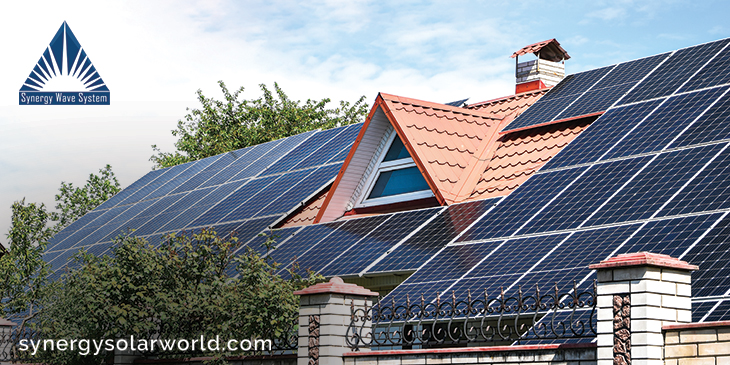Synergy Wave System

Is There a Possibility to Power the Entire House With Solar Panels?
Is There a Possibility to Power the Entire House With Solar Panels?
People spend the whole summer basking in the sun's relentless presence. But, apart from providing us with stunning sunsets and almost endless heat, we seldom realize how the sun influences our existence in other ways.
The idea of green energy to provide electricity to our world without fossil fuels is becoming widely popular nowadays. If people become more conscious of renewable energy choices, an increasing number of people will search for renewable energy sources to fuel their homes. And, then it may raise some questions too. The most frequent one may include: Can solar panels power the whole house?
The answer to this question depends on various factors, including how much space you are using in your house and how much sunlight strikes your roof daily. Although most people will still find it prohibitively costly to install solar lighting system at their residence, solar panel installation costs are decreasing.
But, before you contact the local solar panel company for installation, you must learn some essential facts about solar panels.
Solar Energy: How does it Work?
Stated, a solar panel generates energy by allowing photons, or light rays, to kick electrons away from atoms. Now, depending on how much chemistry you recall from high school, this sentence may sound confusing to varying degrees, but the key takeaway is that sunlight is transformed to energy by a complex but straightforward mechanism that includes absorbing the sun's energy and converting it to electricity. When energy is produced, it is used to power machines, appliances, and homes.
Calculate the Electricity You House Needs Before Installing Solar Panels
To determine if you can run your entire home on solar panels, you must first determine how much electricity you use. A typical house consumes approximately 3,000kWh of energy per year, but yours could be lower or higher based on various factors. It can be calculated from your utility bills or by obtaining an estimation by an impartial energy surveyor.
You should calculate how many photovoltaic panels you require to protect you for the whole year. But this can be done only if you know how much electricity you are going to need. The performance of various solar panels differs, but in general, a 1kW installation will produce about 850kWh per year. On the other hand, a 2kW system will have 1,700kWh, 3kW installation will create 2,550kWh, and a 4kW facility will make approximately 3,400kWh.
It means that a typical home will need a 4kW solar system to meet its total electricity demand for the year quickly.
Get Your Electricity System to Grid Independent
There are a few things to keep in mind if you want to live off the grid. To begin, you should reduce your energy intake as much as possible. Why is this so?
You take electricity for granted, but being self-sufficient from the grid necessitates considerable expenditure in reducing the reliance on it. Many power-hungry machines, such as heating and cooling, would increase the number of solar panels needed.
Dishwashers, driers, and boilers are among the most costly electrical heating equipment to use. Anything including heat is an expensive form of consumption. One challenge is solved if you can find alternate sources of heat.
Get a Solar Battery for Your Home
If you've determined which device is best for you, the next step is to locate a suitable battery capacity. Without battery backup, you would only be able to use power in the morning, inconvenient.
Many families walk out of the house in the morning and go to school or work. Since there is no sunshine at night, you will not have electricity when you need it.
A solar battery is an essential component of your solar energy system for this purpose. The electricity that your solar panels consume in the morning can be stored in your solar battery. It would encourage you to be using the stored power at night when you are most in need of it.
Since you pay for what you are using, the electricity you generate will be cost-effective. You're generating renewable electricity for your house, which is critical for potential grid independence.
Powering Your Whole House by Using Solar Panels
If you intend to fuel your home solely with solar panels, you must prepare ahead of time. To assess your intake, conduct a power audit in your house. If you've determined your use, look for the right solar lighting system and buy a solar battery.
